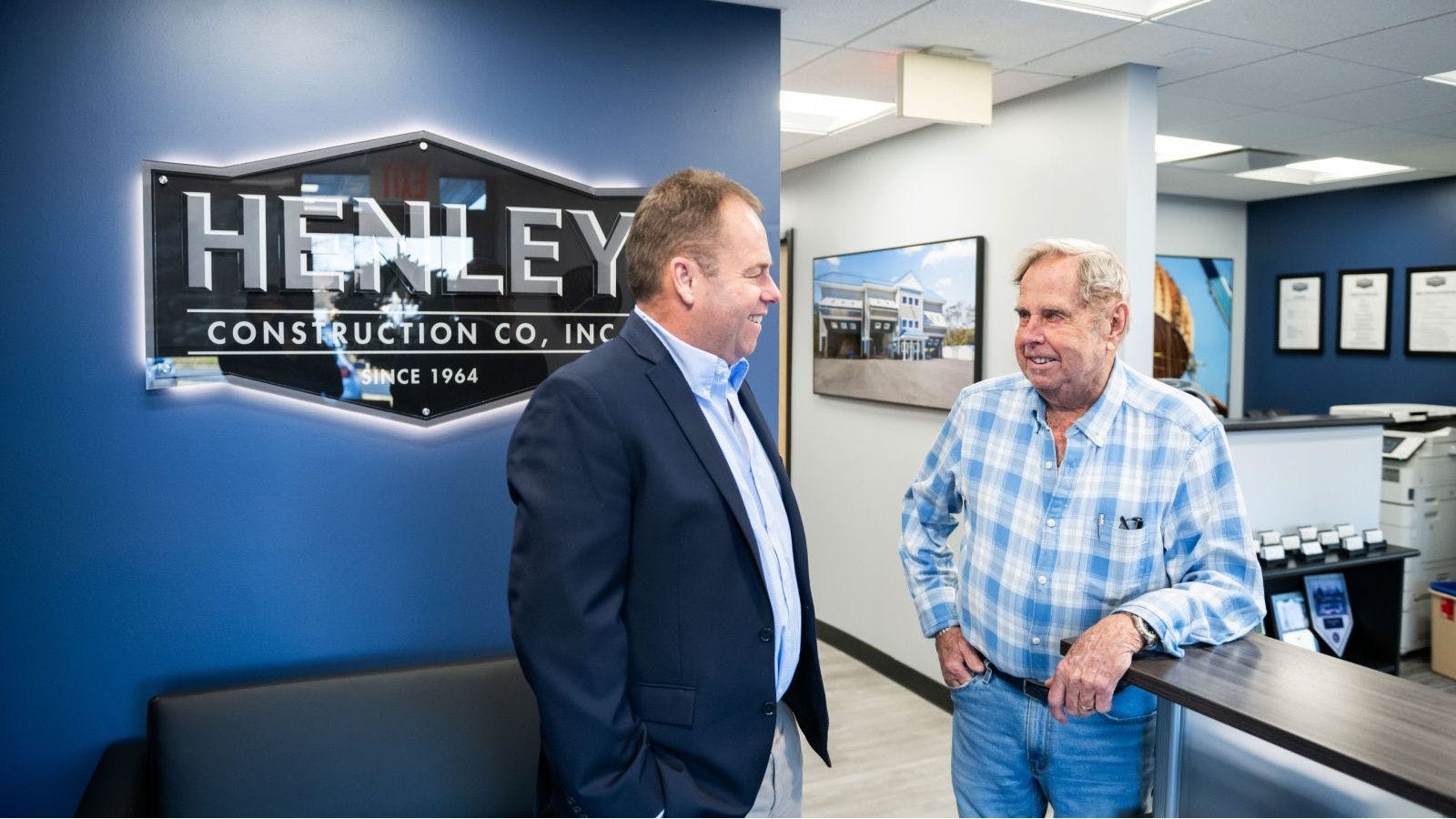
Family Values: Meet ABC 2024 National Chair Buddy Henley
ABC 2024 National Chair Robert C. “Buddy” Henley has followed in the footsteps of his father, Robert J. “Bob” Henley, for almost all his four-decade career in construction. Buddy grew up in the industry and began working summers when he was 16, as a laborer at Henley Construction, the company his father founded in 1964. “My mother always wanted me to be an engineer,” he says, “but I preferred building things, so this was a natural fit.”
Following those high-school summers came a degree in economics from the University of Maryland, College Park. After graduation in 1988, Henley went to work for his father full-time. Beginning in the field—again as a laborer—he soon transitioned to a supervisory role when a jobsite found itself in need of a substitute superintendent. Henley went on to complete several more projects while serving in that position.
Falling in love with the industry, Henley quickly found his footing within his father’s company. On a particularly windy, wintery day in December 1996, he moved from the field to the office. “It was about 22 degrees outside when I got the call from my father mentioning there was an opening as a project manager,” Henley says. “I said, ‘Wow! The office for winter sounds like a great transition.’”
Today, Buddy Henley oversees the entire office and field operations as president of Gaithersburg, Maryland–based Henley Construction, with his father in the role of CEO. “There were never any points of doubt that this was for him,” Bob Henley says. “I was always confident [in Buddy].”
While Buddy may be serving as ABC’s top volunteer leader, Bob was responsible for Henley Construction first becoming an ABC member company—and helping grow the national association locally. “[Henley and other member companies of the Metro Washington chapter] used to meet in the basement of a Holiday Inn,” Bob Henley says, “and we’d go out Thursday nights and try to drum up new people to join.” Simple yet effective, their efforts eventually led to the expansion of ABC’s Mid-Atlantic chapters, which now include Metro Washington, Greater Baltimore, Chesapeake Shores, Delaware, West Virginia and Virginia.
Buddy isn’t the only Henley who made Henley Construction into a family business. His sister, Robyn, joined the company following her college graduation in 1985 and worked there until she passed away in 2021, eventually serving as Henley’s chief financial officer. She and her brother were opposites in many ways, and that was reflected in their work—Robyn took care of financials, insurance and back-office operations, while Buddy oversaw field operations. “It was a good partnership that way,” Buddy Henley says. “We really complemented each other. When she passed, there was a void, not only with the work she did, but also her dedication and the culture that she brought.”
The theme of family continues. While Buddy oversees all of Henley Construction, he spends most of his time at the Gaithersburg headquarters while his cousin, “who is more like a brother to me,” acts as operations manager for the Eastern Shore office. Buddy’s younger daughter, Carrie, is a sophomore at New York University, where she is studying collaborative arts; she has shot and edited videos and created employee manuals for Henley Construction. His older daughter, Katie, attends Loyola University Maryland and aims to obtain her Ph.D. in psychology following her graduation in 2024. While neither of his daughters plans to join the family business, Buddy still gets to enjoy time with them in much the same way he did with his father, fishing and shooting or simply enjoying the outdoors together.
Buddy Henley has watched his father get deeply involved with ABC on a chapter level; while he has been involved on the national level, serving as regional vice chair for the Mid-Atlantic region and working with several past national chairs. He has gleaned wisdom from all the leaders in his life—paternal and professional—and now he is drawing on that life and industry experience for his tenure as ABC’s 2024 national chair. “It is an honor to be named 2024 chair,” he said during a recent interview with Construction Executive at Henley Construction’s headquarters office, “but more of an honor to be able to not only work with my dad but to lead the company that he started. I try to do him justice every day.”
How is leading your company and ABC different from your previous experience as a Henley employee and an ABC member?
So, you must operate and behave as an example to others. You have more pressure to do the right thing, especially when it comes down to safety. And that helps make us better in the long run, not only in the safety aspect, but also that we don’t want to become irrelevant; we want to adapt. Whether it be through how we engage with our workforce or the technology we employ, we must adapt and evolve. We want to be at the forefront of that evolution.
How do you distinguish your leadership style from your father’s?
For me, the values that my father had are still here. There would be nights and weekends he would be up here working on equipment. There have been many nights I sat in this office all night doing work; you do what it takes to succeed.
But I do think that when he started the company 60 years ago, it took something different to start a company from scratch than it would today. He had to do a lot more himself. I respect that. People today operate differently than they did back then, so that approach has also had to evolve. You must adapt with the times and the new generation of workforce.
How have you seen Henley’s workforce–and the workforce of the construction industry as a whole–change over time?
I remember hearing a story. It was in the 1970s; Henley was working on a project. They were prepping for concrete slabs, and they would shovel the gravel and wheelbarrow it across to dump it. If you brought a Bobcat out, they would look at it like “get that thing out of here.” They would only use it while the supervisors were there, then they’d park it and go back to shoveling on their knees with the wheelbarrow, not realizing the time-saving device they had at their hands—but that was the way they’d always done it. So, the equipment as well as the mindsets have changed.
How is Henley approaching the workforce shortage and the challenge of recruiting and retaining, teaching the younger generation and passing on the wisdom of the older generations?
Something we always try to do with our workforce in the field is to pair them with a mentor. So, we would pair up an older, more experienced superintendent with somebody who’s still evolving, and between the two hope they complement each other—that the more senior person would gain some advantage by having the technology that the younger person would bring to help expedite the project, but also train the younger person with some of the experience of how to handle various situations that may arise throughout a project.
That mentorship also applies to project managers and craft workers. There’s more than one way to do everything, so I try to maintain an open mind. If somebody’s got a better way to do things, I’ll listen.
What newer technologies do you consistently employ, and what are you looking to break into next?
AI is something new to me, and it’s something I’m just learning about. We have drones—we do monthly drone shots of all our jobs and topographic surveys, ones that are heavy with civil work. That’s been a big, big plus. It really helps us document changes and capture costs with our owners.
Project-management technologies have also been huge. The ability to share RFIs and submittals seamlessly has expedited how we operate. You can get decisions on items much more quickly; it’s improved the flow of communication.
But if you really need something on your site, you have to pick up the phone and talk to somebody, because it’s still a business built on relationships. If you call somebody with an urgent request, they are more likely to respond than they are with email. That is still a part of the business which remains true today—it’s certainly still a business of people.
What actions are you taking to help prepare your company—and the entire industry as well—for the future?
I encourage all ABC members to participate in the CBI [Construction Backlog Indicator] survey. That data is invaluable to ABC to help us project where the industry is going. It provides invaluable information to use in several ways, and it is information that is shared with membership. As a business owner, I can oversee the trends that are coming, so I can plan accordingly.
In addition, we recently applied for and received ABC Accredited Quality Contractor status. Like how STEP is a world-class safety program, AQC sets guidelines and benchmarks for what companies need to do to achieve this recognition. That status demonstrates our company’s commitment to safety, technology, workforce training and developing our people, as well as our commitment to giving back to the community. So, AQC really demonstrates that we are a leader in the industry. It also helps our company go out and get new projects because of the value we provide to the communities where we are working.
How would you plan to use your term as national chair to set ABC up for success in the years to come?
What I am trying to do is set the organization up for success for the next generation. If I do that, I will feel I have been successful, and that applies to not only the technology and the workforce but also leadership and the markets we serve. It’s really about trying to look ahead to where the industry will be in five years, and to plan ahead and invest in that future. A lot of my thoughts are about where we need to be then.
Every year we do a five-year strategic plan, and we set a one-year goal for each of those items in the plan. I would like to see us hit all those goals: political, membership, total human health and safety, workforce development. If we can achieve the goals we have in the strategic plan, it will be a successful year.
Related stories








